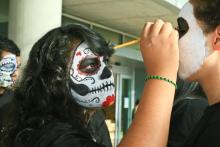Overview
The Minor in Chicano/a Studies is an interdisciplinary program that introduces students to the complex experiences, history, cultural practices, and social interactions of one of the largest ethnic groups in the United States. The program has been designed around conceptual and theoretical units that are central to Chicano/a Studies as a field. In the upper division courses, students, in final papers/projects, will be able to critically examine the concepts below as they tie in to each particular course. UC Merced's Minor in Chicano/a Studies is organized around the following central questions that the program will explore, and students will address, from multiple disciplinary perspectives:
- The role that race and ethnicity play and have played in shaping the experiences of different ethnic groups in the United States, with an emphasis on Chicanos/as;
- the dynamics of migration and immigration, and the ensuing changes in identity, language, social and cultural practices, and national (or transnational) allegiances; particular attention will be paid to the borderlands and its role in defining a Chicano/a identity over the years;
- cultural contact and conflict in a historical context, including an in-depth examination of activism and its role in raising consciousness, political mobilization (both contentious and non-contentious behavior), building a sense of community, and advancing Chicano/a civil and human rights;
- literature and the ways in which it reflects and advances social changes, produces artistic renditions of Chicano/a and non-Chicano/a life, facilitates a sense of community, and interacts with readers from different cultural backgrounds;
- language, with special attention to bilingualism, the social and the artistic uses of mixing languages, as well as the tension between spoken and written versions of those languages;
- the indigenous component of the Chicano/a identity; Chicanos/as are the descendants of multiple indigenous groups from present-day Mexico and the United States, and exploring that descent is central to Chicano/a studies.
Program Learning Outcomes
Students who complete the minor in Chicano/a Studies will develop an understanding and appreciation of Chicanos/as as a group with a particular history, social and cultural experience, aesthetics, politics, and linguistic practices. More specifically, upon graduation from the Chicano/a Studies Program:
- Students will be able to identify and analyze (both verbally and in writing) Chicano/a cultural practices, including an understanding of their origins, historical development, and social contexts;
- Students will understand the role that race, gender and ethnicity have played in defining Chicanos/as as a group, and they will be able to apply that knowledge to specific academic areas (e.g. literature, anthropology, etc.);
- Students will be able to recognize and discuss internal differences within the Chicano/a group, and to relate those differences to processes of migration, diaspora, transnationalism, and other forms of geographical displacement, as well as to their indigenous roots in the Americas;
- Students will understand the role that activism and struggle have played in building a Chicano/a consciousness;
- Students will be able to recognize the main elements of a Chicano/a aesthetics, as manifested in literature and language, as well as in cultural practices and rituals.
- For upper-division courses, students will be able to produce research papers exploring topics salient to Chicano/a Studies.
Refer to the Curriculum Map to see the coherency between the Program Learning Outcomes and our course offerings.
Program Assessment Results
The 2013-2014 academic year is our second year of program assessment. We are building our minor, offering the first Chicano/a Studies course in the fall 2013. To date, we have small samplings of student work and feedback surveys that reflect our developing program. We will continue to work to increase our student population and sample size for program assessment. Please check back in the fall 2014 for program assessment results.
Updated 2021



